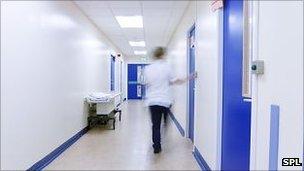Is the NHS set for an autumn of discontent?
- Published

The government is facing a busy few months with the NHS
The NHS was meant to be the government's good news story.
As one of the few areas of spending not facing cuts, the Tories formed a coalition government believing their handling of the health service would be something to shout about.
Less than a year into government the wheels started coming off when MPs, health unions and academics began questioning the NHS reforms.
For a few months in spring the overhaul of the system dominated the headlines.
But with the Health Bill back in Parliament and a host of other problems piling up, the autumn could prove to be even more difficult.
The critics are still not completely won over
In what was an unprecedented move, the government put its health reforms on hold in April amid mounting criticism about the changes it was making to the NHS.
A two-month "listening exercise" ensued, followed by a series of concessions, watering down the extent of competition, the pace of change and the power of GPs.
The hope of ministers was that the measures would be enough to move forward with much greater support for its plans.
The changes were widely welcomed at the time.
But the latest signals from a host of influential groups suggest more needs to be done.
Concern is still being expressed about the role of competition. Unions have accused ministers of trying to privatise the NHS - something they deny.
But even more pro-market groups have suggested there is a lack of clarity.
However, this is just the first of a long list of grievances that still linger.
Increased bureaucracy, the role of the secretary of state, how to protect essential NHS services and centralisation of power are all on the critics' hit list.
The Lords are ready for a fight
Since the start of 2011 peers have been organising a host of seminars on the Health Bill.
During the sessions, many lasting two or three hours, they have taken soundings from doctors, unions and academics.
They wanted to make sure they were fully briefed to scrutinise the bill.
That time is nearly here. Once the House of Commons finishes its two days of debate this week, it will be passed on to the upper house.
It will be the start of October before peers get their teeth really sunk into it.
But already they are promising a fight.
Lib Dem peer Baroness Williams has been one of the most vocal opponents throughout the whole process.
But there are a host of doctors and lawyers who are also in the Lords who are widely known to have shown an interest in the changes.
It promises to be a bumpy ride for the government.
Hospital closures seem unavoidable

A wave of new hospital developments have happened in the past decade
In opposition the Tories made much of their desire to fight closures of local hospital services.
David Cameron even promised he was willing to have a "bare-knuckle fight" over the issue.
But now they are in power they face - along with their Lib Dem partners - the task of making those tricky decisions.
There is now growing consensus that there are too many hospitals in England.
Firstly, the advances in technology and treatment in recent decades mean that a growing body of complex care, such as cancer treatment and heart surgery, needs to be done in larger, specialist centres.
Meanwhile, district general hospitals are finding themselves squeezed again because of the ageing population.
Having people living longer means more and more of the health budget is going on people with long-term conditions such as diabetes and heart disease.
These patients are often better cared for in the community where health professionals can spend more time with them preventing their conditions getting worse.
The first major test of the government's position on this is imminent.
In the health secretary's in-tray is a proposal, put forward by the local NHS in north London, to close A&E and maternity services.
Access to services seems to be getting harder
Despite protecting the NHS budget, the health service is still having to make savings.
It has been tasked with finding £20bn over the next four years - that is about 4% a year from its annual budget.
The government argues this can be made through making the service more efficient, but the fear is that the NHS will fall back on the easier option of restricting access to care.
Reports have emerged of NHS trusts limiting access to some services, such as IVF, while completely stopping funding others.
There are also signs that waiting times may be on the rise.
The prime minister recently reiterated his commitment to keeping waiting times for hospital operations to below 18 weeks.
In practice, that means nine in 10 patients have to be seen that quickly to reflect the fact there are valid medical and personal reasons why some people wait longer.
In a third of areas, this standard is being breached, although nationally it is being kept because other areas are overperforming.
With winter just round the corner - when more demands are placed on the health service - the situation is likely to get worse before it gets better.